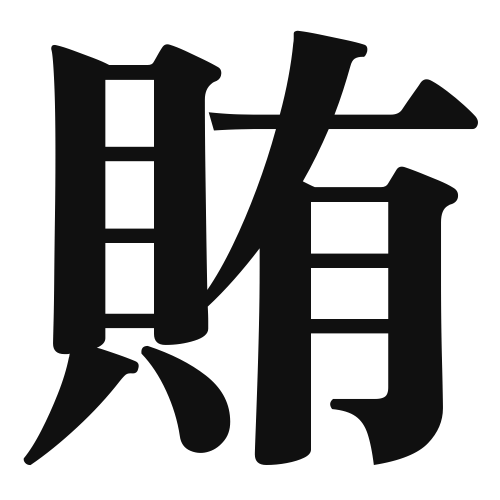1. Overview of Meaning
The kanji “賄” (pronounced “wai”) generally means “to bribe” or “to provide a meal.” It often carries a negative connotation, associated with corruption or unethical practices in various contexts.
2. Formation and Radical
Formation of the Kanji: The kanji “賄” is a compound character, which means it is formed by combining different elements. It consists of the “貝” (shell) radical, which is often associated with money or valuables, and the phonetic component “会” (to meet), suggesting a gathering or transaction.
Radical: The radical of “賄” is “貝,” which signifies wealth or valuables, reinforcing the idea of monetary exchange.
3. Examples of Usage
Common Words and Phrases:
- 賄賂 (わいろ, “wairo”) – bribe
- 賄い (まかない, “makai”) – meal provided, often in a workplace setting
Example Sentences in Daily Conversation:
- 彼は賄賂を渡したことで逮捕された。
(He was arrested for giving a bribe.) - このレストランでは、賄いがとても美味しい。
(The meals provided at this restaurant are very delicious.)
4. Synonyms and Antonyms
Similar Kanji:
- 贈 (おくる, “oku”) – to give or present, which has a more positive connotation compared to “賄.”
Antonyms:
- 正直 (しょうじき, “shoujiki”) – honesty, which represents the opposite of bribery and corruption.
5. Cultural and Historical Background
Relation to Japanese Culture: The concept of “賄” is often discussed in the context of politics and business in Japan, where bribery scandals can have significant repercussions. It reflects societal values regarding integrity and ethics.
Proverbs and Idioms:
- 「賄賂は悪の根源」 (Bribery is the root of evil) – This saying emphasizes the negative impact of corruption on society.
